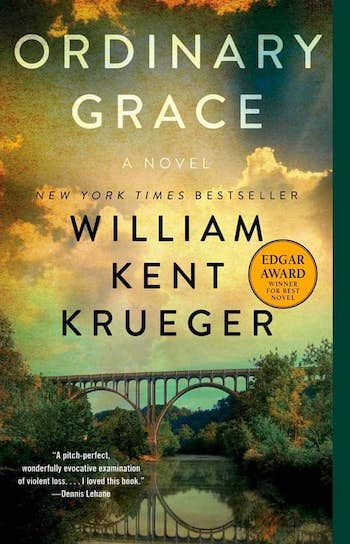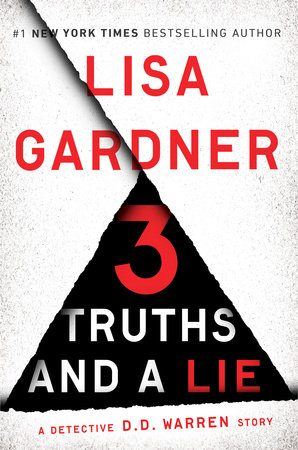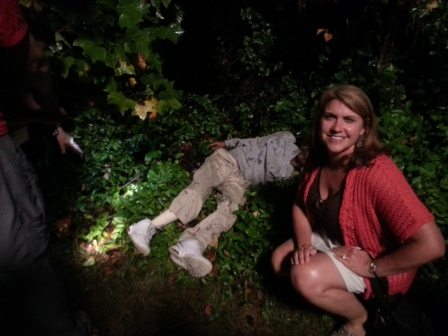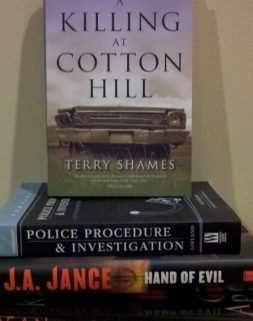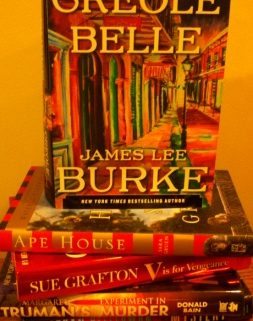I’m an voracious reader which means I’m rarely without a book close at hand. It’s an addiction. I have to have my word fix every day. I have books in my office, on my nightstand, in the kitchen (I sometimes read while I’m cooking dinner, between stirs and seasonings), in my truck, in bed, etc. Actually, my day ends with a bit of reading before closing my eyes to sleep.
I like different genres, especially literary and historical fiction, but a good mystery/thriller/suspense story is hard to beat. After all, who doesn’t love a well-written and convoluted whodunit?
Recently Read
I recently completed Ordinary Grace, a beautifully-told emotional tale by William Kent Krueger (highly recommended). It’s a literary novel that will linger in your mind for quite a while after devouring the final page.
Krueger’s Ordinary Grace takes us into a world where a boy becomes an adult far before his time. It’s murder, betrayal, and lies that send him on a convoluted path that bypasses what should have been a childhood filled with innocence.
And, speaking of innocence …
When Fiction and Real-Life Collide
I’m currently deep into John Grisham’s new book The Guardians, a tale about a group of lawyers who fight for the wrongly imprisoned—innocent men and women who’re serving hard time for crimes they didn’t commit. Along his journey, the lead character finds the paths leading to justice for his clients are pockmarked with danger.
The writing and voice in this novel are stellar.
As I plow through The Guardians, nearly every page reminds me of Ray Krone, a man who served 10 years on death row for a murder he didn’t commit. Some of you may recall that Ray wrote of his horrible experience here on this blog in an article titled Ray Krone: A Decade On Death Row.
Ray’s story and Grisham’s fictional tale run parallel to the current state of courts in the U.S., where criminal suspects, due to massive caseloads, are pushed through the system at near blinding speeds, rates that move more quickly than the science that’s often used to place them behind bars.
Bite-Mark Evidence
In Krone’s case, his conviction was based solely on bite-mark evidence, “science” that, like hair comparison, has been found to be unreliable. In fact, approximately three dozen or so exonerations have resulted from a re-examination of cases whose basis or, basis in part, for conviction were on the forensic comparison of bite marks.
For example, the cases of William Richards in California, who spent 25 years behind bars for his wife’s murder, and Keith Allen Harward in Virginia, who was sentenced to 33 years behind bars for a rape and murder. And then there’s our friend Ray Krone, an innocent man who was was 35-years-old at the time of his arrest, and didn’t walk as a free man again until the age of 45. All based on what many now call junk science.
Grisham’s book is an eye-opening read. It’s also a tale that’ll keep the reader turning page after page, hoping the attorneys will find a way to have their clients’ cases re-examined (a larger than massive uphill battle). And with the turn of every page I can’t help but think of Ray’s ordeal, sitting behind bars waiting to be put to death for a crime he didn’t commit. Imagine being confined in a concrete and steel box without sunshine or fresh air, with no control whatsoever of your own life and how you’ll live it. Grisham, I think, captures a great deal of this, including bite-mark evidence, in the book.
I also wonder how many more innocent people are in circumstances similar to the characters in Grisham’s book, and those who, like Ray Krone, wake up each day one step closer to the electric chair, gas chamber, or cocktail of drugs designed to kill. And, even more horrible is to wonder not if, but how many innocent people have already been executed.
“Cullen Post travels the country fighting wrongful convictions and taking on clients forgotten by the system. With Quincy Miller, though, he gets far more than he bargained for. Powerful, ruthless people murdered Keith Russo, and they do not want Quincy Miller exonerated.
They killed one lawyer twenty-two years ago, and they will kill another without a second thought.”
“‘Ordinary Grace’ is a brilliantly moving account of a boy standing at the door of his young manhood, trying to understand a world that seems to be falling apart around him. It is an unforgettable novel about discovering the terrible price of wisdom and the enduring grace of God.”
- New York Times bestseller
- Winner, Edgar Award for Best Novel
- Winner, Anthony Award for Best Novel
- Winner, Macavity Award for Best Mystery Novel
- Winner, Barry Award for Best Novel
- A School Library Journal Best Book of 2013



